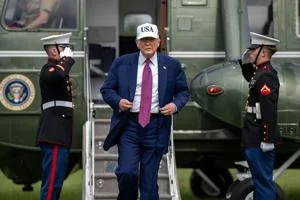President Donald Trump outlined the framework of a trade deal with leaders in Seoul on Wednesday that will include a 15% tariff on imports from South Korea.
Trump announced the deal Wednesday afternoon in another social media post, providing few details about the scope of the agreement.
Under the terms Trump outlined, South Korea will buy $100 billion in U.S. liquefied natural gas or other energy products and give the U.S. $350 billion for investments.
“The Deal is that South Korea will give to the United States $350 Billion Dollars for Investments owned and controlled by the United States, and selected by myself, as President,” Trump wrote on Truth Social.
Trump said South Korea would announce further U.S. investments in the coming weeks when South Korean President Lee Jae Myung visits the White House.
“South Korea has agreed to invest a large sum of money for their Investment purposes,” Trump wrote.
As with a string of other trade deals Trump has announced in recent weeks, Trump said South Korea would open its markets, tariff free, to the U.S. Trump said that it would include automobiles, trucks and agricultural products.
So far, a 15% import duty is the lowest Trump has announced in recent trade deals. Only the United Kingdom, which didn’t have a substantial trade deficit with the U.S., got a 10% tariff.
Trump’s deal with the EU includes a 15% tariff on imports, although the pact still needs the approval of all 27 members of the bloc.
Trump has announced deals with Indonesia (19% tariff on imports), the Philippines (19% tariff on imports), and Japan (15% tariff on imports).
Earlier Wednesday, the U.S. president threatened India with a 25% tariff and a “penalty” for buying from Russia.
In 2024, U.S. trade with South Korea totaled an estimated $197.1 billion. U.S. goods exports to South Korea were $65.5 billion, while U.S. goods imports from South Korea totaled $131.5 billion. That year, the U.S. goods trade deficit with Korea was $66 billion.
Economists, businesses and some publicly traded companies have warned that tariffs could raise prices on a wide range of consumer products.
Trump has said he wants to use tariffs to restore manufacturing jobs lost to lower-wage countries in decades past, shift the tax burden away from U.S. families, and pay down the national debt.
A tariff is a tax on imported goods paid by the person or company that imports the goods. The importer can absorb the cost of the tariffs or try to pass the cost on to consumers through higher prices.






